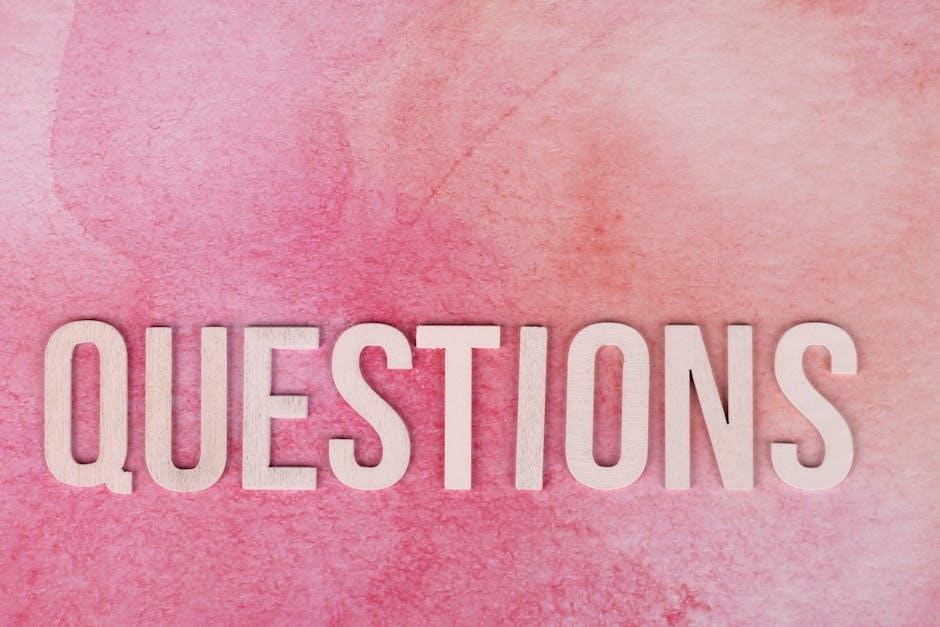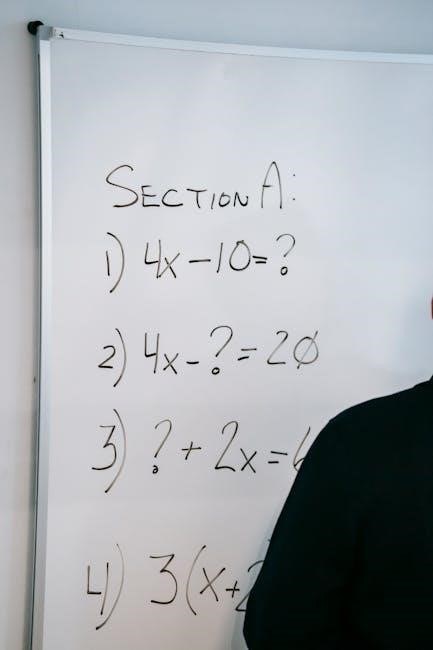wh questions worksheets pdf
WH questions worksheets are essential tools for mastering English grammar, focusing on who, what, where, when, why, and how. These PDF resources provide structured exercises to help learners practice forming and answering questions effectively, improving communication skills and grammar accuracy.
What Are WH Questions?
WH questions are inquiries that begin with question words such as who, what, where, when, why, and how. These questions are used to seek detailed information and typically require full-sentence answers. For example, “Who is the man in the blue shirt?” or “What time does the meeting start?” They are essential in both spoken and written English, helping to clarify specifics about people, places, events, and reasons. Unlike yes/no questions, WH questions encourage the sharing of more information, making them vital for effective communication. They follow a specific structure, often starting with the WH word, followed by a verb and subject, and are widely used in conversations and formal writing.
Importance of Practicing WH Questions in English
Practicing WH questions is crucial for developing strong English communication skills. These questions are fundamental in seeking detailed information and are widely used in everyday conversations, education, and professional settings. Mastering WH questions enhances clarity in expression and understanding, enabling learners to ask and answer effectively. It improves listening and comprehension skills, as forming and responding to WH questions requires precise language use. Regular practice also boosts confidence in using English accurately and appropriately. For ESL learners, focusing on WH questions helps bridge language gaps and fosters fluency. Regular exercises ensure learners can articulate their thoughts clearly and engage confidently in various social and academic contexts.
Benefits of Using Worksheets for Learning
Using worksheets for learning WH questions offers numerous benefits. They provide structured, clear, and focused exercises tailored to specific grammar topics, ensuring learners grasp concepts effectively. Worksheets cater to different learning styles, offering activities like fill-in-the-blanks, matching, and multiple-choice questions. They allow learners to practice at their own pace, reinforcing understanding and retention. Worksheets also enable immediate feedback, helping learners identify and correct mistakes. Additionally, they are accessible in PDF format, making them easy to download and print for convenient use. Regular practice with worksheets enhances language proficiency, boosts confidence, and streamlines the learning process for students of all levels, including ESL learners.

Types of WH Questions Worksheets PDF

WH questions worksheets include fill-in-the-blanks, matching activities, true/false questions, question creation tasks, and multiple-choice exercises, catering to varied learning styles and skill levels effectively.
Fill-in-the-Blank Exercises
Fill-in-the-blank exercises are a popular type of WH questions worksheet. These activities provide sentences with missing words, requiring learners to fill them in with appropriate WH words like who, what, where, when, why, or how. This format helps students practice question formation and context understanding. For example, a sentence like “________ are you going tonight?” might require the word where; These exercises are available in PDF format, making them easy to download and print for classroom or home use. They often come with answer keys, allowing learners to check their progress. Fill-in-the-blanks are effective for reinforcing grammar rules and improving sentence structure skills.
Matching Activities
Matching activities in WH questions worksheets involve pairing questions with correct answers or contexts. Learners match WH questions like “Who is your favorite singer?” with answers such as “My favorite singer is Taylor Swift.” These exercises enhance understanding of WH words and their usage in sentences. They often include multiple-choice or drag-and-drop formats, making practice engaging. Matching activities improve grammar, vocabulary, and reading comprehension. Examples include aligning questions with scenarios or images, helping students grasp question formation and context. These exercises are widely available in PDF worksheets, suitable for various levels, and ideal for both classroom and self-study. They are effective for reinforcing WH question structures and promoting interactive learning.
True or False Questions
True or False questions in WH questions worksheets involve learners determining the accuracy of statements related to WH words. These exercises enhance comprehension and critical thinking. For example, a statement like “She lives in Paris” might be paired with a WH question like “Where does she live?” Learners then assess if the answer matches the question. This format reinforces understanding of WH question structures and their appropriate usage. True or False activities are often included in PDF worksheets, offering a variety of levels and contexts. They are particularly effective for reinforcing grammar rules and promoting interactive learning. These exercises also help students develop accuracy in forming and answering WH questions effectively.
Question Creation Tasks
Question creation tasks in WH questions worksheets PDF involve learners crafting their own WH questions based on provided contexts or sentences. These exercises enhance creativity and reinforce grammar skills. For instance, students might be given a sentence like “She went to the park yesterday” and asked to form a WH question starting with “Where” or “When.” This activity helps learners understand how to structure questions correctly and use WH words appropriately. Such tasks often include answer keys for self-assessment, making them ideal for independent practice. They are particularly useful for developing critical thinking and improving the ability to formulate clear, grammatically accurate questions.
Multiple Choice Exercises
Multiple choice exercises in WH questions worksheets PDF provide learners with a list of options to select the correct WH question or answer. These activities are designed to test understanding and application of WH words in various contexts. For example, a question might present a scenario, and students choose the appropriate WH question to ask about it. Answer keys are often included for self-assessment. These exercises are effective for reinforcing grammar rules and improving test-taking skills. They cater to different learning levels, making them versatile tools for both classroom and independent study. Regular practice with multiple choice exercises enhances confidence and accuracy in using WH questions effectively.

Levels of Difficulty in WH Questions Worksheets
WH questions worksheets are categorized into beginner, intermediate, and advanced levels, targeting foundational, intermediate, and complex questioning skills respectively. This progression ensures learners can gradually improve their ability to form and answer questions effectively.
Beginner-Level Worksheets
Beginner-level worksheets introduce students to basic WH questions using simple vocabulary and sentence structures. These exercises often include matching activities, fill-in-the-blank questions, and basic sentence completion tasks. Designed for young learners or those new to English, they focus on understanding the six main WH words: who, what, where, when, why, and how. Worksheets typically provide clear examples, such as “Who is your teacher?” or “What is your favorite color?” to help students grasp the fundamentals of question formation. They are ideal for building confidence and laying a strong foundation in English grammar.

Intermediate-Level Worksheets
Intermediate-level worksheets are designed for learners who have mastered the basics of WH questions and are ready to tackle more complex grammar and vocabulary. These exercises often include multiple-choice questions, question creation tasks, and information gap activities. Students are challenged to form questions using all six WH words in different contexts, such as “Why did you miss the bus?” or “When will the meeting start?” Worksheets may also incorporate sentence writing and role-playing to enhance fluency. They are ideal for older students or ESL learners looking to refine their skills and improve comprehension. These resources help bridge the gap between basic and advanced question formation.
Advanced-Level Worksheets
Advanced-level worksheets are tailored for proficient learners seeking to refine their mastery of WH questions. These exercises focus on complex sentence structures, nuanced vocabulary, and context-specific questioning. Activities include creating detailed questions for open-ended answers, analyzing context clues, and identifying subtle grammatical errors. Learners are challenged to form sophisticated questions, such as “Why might climate change affect global economies?” or “How could historical events influence modern society?” These worksheets often incorporate advanced vocabulary and complex scenarios, preparing students for real-world communication. They are ideal for those aiming to achieve fluency and accuracy in English, ensuring a deeper understanding of WH question usage in specialized contexts.

How to Use WH Questions Worksheets Effectively
Start with clear instructions, provide examples, and guide learners through practice exercises. Encourage interactive activities and review answers to ensure understanding and effective learning outcomes.
Step-by-Step Guide for Teachers
Begin by explaining the structure of WH questions, focusing on question words like who, what, where, when, why, and how. Provide clear examples to illustrate their usage. Distribute worksheets tailored to students’ proficiency levels, ensuring activities align with lesson objectives. Guide learners through exercises, allowing time for individual practice. Circulate the room to assist and clarify doubts. After completing tasks, review answers collectively, highlighting common errors. Offer constructive feedback to reinforce correct question formation. Encourage interactive activities, such as pair work or group discussions, to apply learned concepts. Finally, reinforce the lesson with homework or additional practice, ensuring students can confidently form and answer WH questions. Adapt activities to suit different learning levels and needs for optimal engagement.
Tips for Students to Maximize Learning
Tips for Students to Maximize Learning
To maximize learning with WH questions worksheets, students should practice regularly and review mistakes. Start with simple exercises like fill-in-the-blanks and matching activities to build confidence. Use flashcards to memorize WH words (who, what, where, when, why, how). Engage in conversations, asking and answering questions to apply what you’ve learned. Listen to native speakers and observe how they form questions. Review grammar rules before completing worksheets to ensure understanding. Seek feedback from teachers or peers to improve accuracy. Mix practice with fun activities like role-playing or creating your own questions. Stay consistent, as regular practice enhances fluency and mastery of WH questions.
Common Mistakes to Avoid
When practicing WH questions, common mistakes include using incorrect question words, improper word order, and forgetting auxiliary verbs. Students often confuse “who” and “what” or misuse “where” and “when.” Another error is placing the subject after the verb in questions (e.g., “What is the book?” instead of “What the book is?”). Additionally, learners may omit the auxiliary verb in questions, such as “Where you live?” instead of “Where do you live?.” To avoid these mistakes, focus on correct sentence structure, practice regularly, and seek feedback. Reviewing grammar rules and completing exercises in worksheets can help build accuracy and confidence in forming WH questions.

Examples of WH Questions Worksheets PDF
Worksheets often include exercises like filling in the blanks, matching questions to answers, and creating questions from prompts. These activities help students practice forming and understanding WH questions effectively.
Sample Worksheets for Different Levels
Sample worksheets cater to diverse proficiency levels, from beginner to advanced. Beginner worksheets focus on basic question formation using who, what, and where. Intermediate levels introduce more complex structures with when, why, and how. Advanced sheets incorporate multi-sentence contexts and nuanced vocabulary. Each level includes varied exercises like fill-in-the-blanks, matching activities, and question creation tasks. These resources ensure learners can gradually build their skills, with clear instructions and answer keys for self-assessment. They are ideal for classroom use or independent study, providing a structured path to mastery of WH questions in English.
Exercises for Specific WH Words (Who, What, Where, When, Why, How)
Exercises targeting specific WH words help learners master each question type. Worksheets for “who” focus on identifying people, while “what” exercises target objects or actions. “Where” questions emphasize locations, and “when” drills focus on time expressions. “Why” and “how” exercises delve into reasons and methods. Activities include gap-fills, matching games, and sentence completion tasks. These exercises ensure learners understand the unique usage of each WH word, improving their ability to form grammatically correct questions. Clear examples and answer keys are provided to aid comprehension and self-correction, making these sheets invaluable for targeted practice.
Information Gap Activities
Information gap activities are interactive exercises where students ask and answer WH questions to complete a task. These activities simulate real-life conversations, encouraging learners to use WH questions naturally. Typically, students are divided into pairs or groups, with each having partial information. For example, one student might have a question set, while the other has corresponding answers. By asking the right WH questions, they fill in missing details. These activities enhance communication skills, problem-solving, and critical thinking. They are ideal for all levels, fostering collaborative learning and ensuring learners understand how to use WH questions effectively in context. Many worksheets include scenarios like completing sentences or matching questions with answers, making learning engaging and practical.

Where to Find WH Questions Worksheets PDF
WH questions worksheets PDFs are widely available online, offering a variety of exercises for different levels. Websites like worksheetspdf.com and ESLprintables.com provide free downloadable resources, including fill-in-the-blank exercises, matching activities, and multiple-choice questions. Premium platforms like TeachersPayTeachers and Educents offer detailed, structured worksheets for advanced practice. Additionally, educational blogs and forums often share custom-made worksheets tailored to specific learning needs. These resources cater to students, teachers, and ESL learners, ensuring comprehensive practice in forming and answering WH questions effectively.

Recommended Websites for Free Downloads
Several websites offer free WH questions worksheets in PDF format. WorksheetsPDF.com and ESLprintables.com provide a wide range of exercises, including fill-in-the-blank, matching, and multiple-choice activities. These resources cater to different learning levels, from beginners to advanced learners. Additionally, platforms like BusyTeacher.org and 123Homeschool4Me.com offer customizable worksheets tailored to specific needs. Many of these sites include answer keys, making them ideal for self-study or classroom use. Teachers and students can download these worksheets instantly, ensuring access to quality materials for effective practice. These free resources are perfect for improving grammar skills and enhancing communication abilities in English.
Premium Resources for Detailed Practice
Premium resources for WH questions worksheets offer comprehensive and detailed practice materials. Websites like Teachers Pay Teachers and Educents provide high-quality, organized worksheets designed for in-depth learning. These resources often include advanced exercises, such as error correction, question formation, and interactive activities. Many premium worksheets cater to specific needs, offering tailored exercises for different age groups and proficiency levels. They may also include multimedia elements, like audio prompts, to enhance learning. Premium resources are ideal for teachers seeking structured lesson plans and for students needing rigorous practice. These materials are well-suited for serious learners aiming to master WH questions effectively, with detailed answer keys and progress-tracking features.

Creating Custom Worksheets
Creating custom WH questions worksheets allows educators to tailor exercises to specific learning needs. Tools like Google Docs, Canva, and specialized worksheet generators enable users to design personalized activities. Teachers can incorporate images, audio, and interactive elements to engage learners. Custom worksheets can focus on particular WH words or grammar structures, ensuring targeted practice. Additionally, educators can align exercises with curriculum goals or address common student mistakes. For advanced learners, custom sheets can introduce complex scenarios or open-ended questions. This flexibility makes custom worksheets a valuable resource for both classroom instruction and individualized learning, catering to diverse student needs and learning styles effectively. They also support differentiated instruction, ensuring all learners can benefit from tailored practice materials.
Consistent practice with WH questions worksheets is key to mastering English grammar. These resources are effective for learners at all levels. Keep practicing for improvement!
WH questions are fundamental in English, focusing on who, what, where, when, why, and how. Worksheets provide structured exercises for learners to practice forming and answering questions, improving grammar and communication skills. These resources cater to all levels, from beginner to advanced, offering activities like fill-in-the-blank, matching, and multiple-choice exercises. They help students understand sentence structure, question formation, and context-based responses. Regular practice with these worksheets enhances fluency and accuracy, making them invaluable for ESL learners and educators. By using these tools, learners can master WH questions effectively, ensuring strong foundational grammar skills for real-life conversations and academic success.
Encouragement to Practice Regularly
Consistent practice with WH questions worksheets is crucial for improving English skills. Regular use of these resources helps build confidence in forming and answering questions, enhancing both speaking and writing abilities. Learners should aim to dedicate time daily to these exercises, gradually increasing difficulty as they progress. Parents and educators can support by providing feedback and encouragement, fostering a positive learning environment. Over time, regular practice strengthens grammar knowledge and communication skills, making WH questions a natural part of everyday conversations and academic tasks. Embrace these worksheets as a valuable tool for achieving English proficiency and lifelong language success.
Future Trends in WH Questions Worksheets
Future trends in WH questions worksheets will likely focus on interactive and digital formats, incorporating technology to enhance learning. Personalized worksheets tailored to individual skill levels and learning goals will become more prevalent. Gamification elements, such as points and badges, will make practice more engaging. Additionally, the integration of multimedia, like audio and video, will provide immersive learning experiences. Accessibility features, such as voice-to-text and text-to-speech, will ensure inclusivity for all learners. Real-time feedback systems will allow instant corrections and progress tracking. These advancements aim to make WH questions practice more dynamic, effective, and accessible, catering to the diverse needs of modern learners in an evolving educational landscape.

